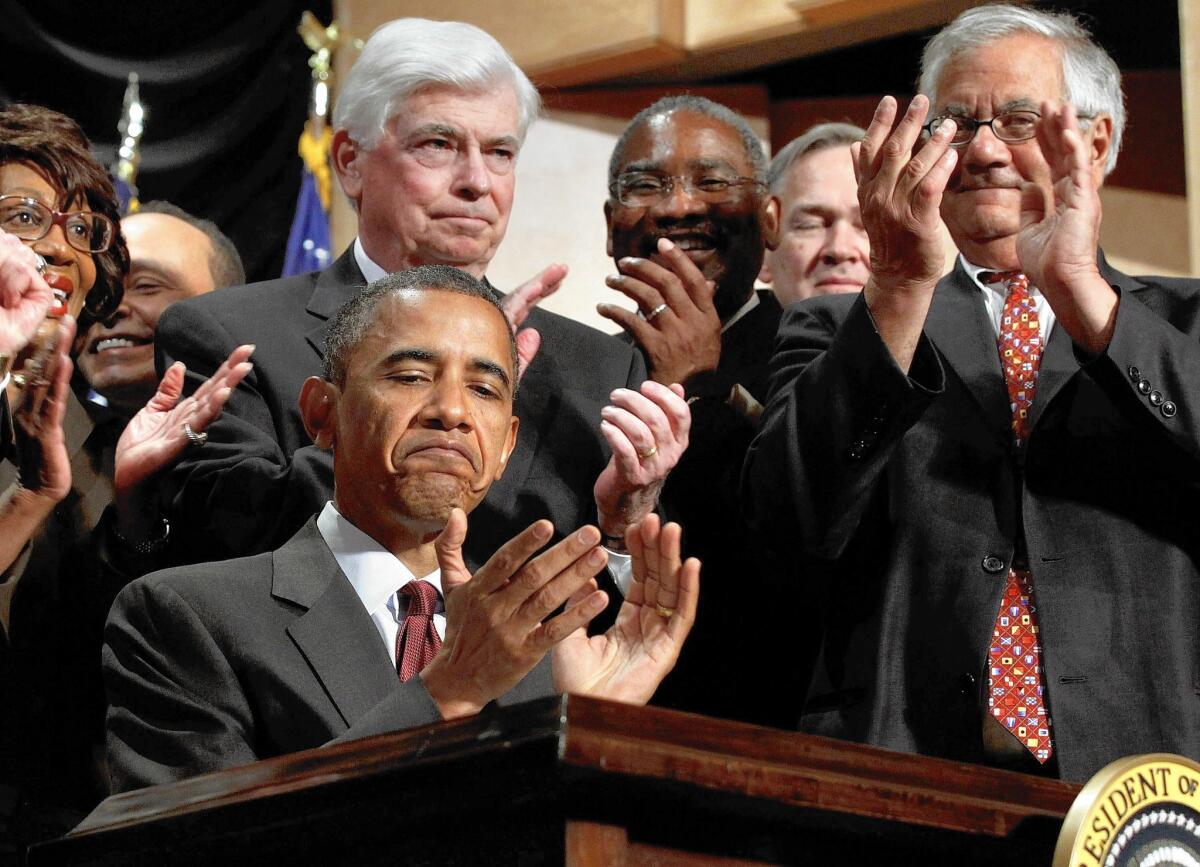Republicans in Congress begin new effort to water down Dodd-Frank law

Boosted by their November election gains, congressional Republicans have launched a new effort to weaken, bit by bit, a law that dramatically expanded federal oversight of the financial system after the Great Recession.
On Wednesday, the Republican-controlled House is expected to pass a package of bills making changes to the 2010 law, known as Dodd-Frank, which also created a powerful new agency to protect consumers.
The law was enacted over nearly unanimous opposition from Republican lawmakers. Many despise Dodd-Frank almost as much as they do Obamacare because they believe it’s an overreaction to the 2008 financial crisis and an unnecessary burden on business.
Now that Republicans have a Senate majority too, Democrats will have more difficulty stopping attempts to chip away at the law’s hundreds of regulations, though President Obama’s veto pen still looms in the White House.
“The truth is Dodd-Frank was not chiseled in stone. Nobody brought it down to us from Mt. Sinai,” said House Financial Services Committee Chairman Jeb Hensarling (R-Texas), who is leading the effort to change the law. “Congress would be negligent in its duties if we did not continually monitor and fix Dodd-Frank’s unintended consequences.”
In the last few weeks, Republicans watered down key parts of Dodd-Frank by attaching provisions to so-called must-pass bills — one funding most of the federal government and another reauthorizing an important terrorism risk insurance program that had expired. Obama signed the bills despite his opposition to their changes in Dodd-Frank.
The maneuver provided an early road map to how the new Republican-controlled Congress might try to make long-sought changes to financial regulations over Obama’s objections.
Liberal Democrats, led by Sen. Elizabeth Warren (D-Mass.) and Rep. Maxine Waters (D-Los Angeles), are rallying to stop the effort.
They nearly derailed the government funding bill last month because it contained a provision that eased Dodd-Frank restrictions on bank trading of financial derivatives — the type of complex investments that helped trigger the financial crisis.
Liberals’ anti-Wall Street fervor was highlighted this week when investment banker Antonio Weiss withdrew his nomination to a senior Treasury Department position because of opposition from Warren and others who objected to his Wall Street background.
“We’ve already seen that the new Republican Congress is going to aggressively attack the Dodd-Frank act,” said Warren, who was an outspoken advocate for the legislation. She launched the law’s Consumer Financial Protection Bureau before winning a Senate seat in 2012.
“The risk of another financial crisis remains too high, and we should be strengthening financial reforms, not rolling them back to benefit Wall Street,” she said.
The proposed changes before the House now include a controversial two-year delay in implementing part of the so-called Volcker Rule, which bars banks from making risky investments. The changes are necessary, supporters say, to avoid saddling businesses with heavy-handed regulations.
The White House said Obama would veto the bill because “the administration has strong concerns with any provisions that would weaken key consumer and investor protections and elements of financial oversight.”
Most Democrats have vowed to keep the law intact.
“We have seen this movie before,” said Sen. Sherrod Brown (D-Ohio). “We will keep seeing it over and over again.”
But some changes are needed, said Francis Creighton, executive vice president of government affairs at the Financial Services Roundtable, an industry trade group. He argued that Democrats are overreacting to sensible and relatively small-scale fixes.
“Sometimes we’re trying to do things that will actually make the system work better,” he said. “We’re not always twisting our mustache, doing this villainously.”
The delay in the Volcker Rule, for instance, is necessary to avoid pushing banks into getting rid of some assets in a “fire sale” fashion, Creighton said. The legislation in the House would extend an existing delay in implementing the rule to 2019 from 2017.
Republicans note some of the Dodd-Frank changes have bipartisan support.
The legislation that includes the Volcker Rule delay, called the Promoting Job Growth and Reducing Small Business Burdens Act, garnered 35 Democratic votes last week when Republicans unsuccessfully tried to pass it in an expedited procedure that required a two-thirds vote.
The focus liberals have put on changes to Dodd-Frank in recent weeks has made it tougher for Democrats to support the Republicans, said former Rep. Barney Frank (D-Mass.).
“I’ve talked more about the bill in the last couple of months than in years, and that’s a good thing,” said Frank, who led the effort to pass it in the House in 2010. “It’s now become a national issue again and I’m very confident the public will become very angry” if Republicans continue to attack it.
The biggest mistake Republicans could make would be to try to weaken the Consumer Financial Protection Bureau, which is popular with the public, Frank said.
The bureau has a director, who is appointed by the president to a five-year term, and is funded directly by the Federal Reserve, which means Congress can’t cut its budget.
Republicans complain the agency is too powerful and want to replace the director with a five-member commission and subject its funding to the congressional appropriations process. The House has approved legislation in the past to make those changes, but the bills have died in the Senate.
It’s unclear whether Senate Republicans now will be able to pass Dodd-Frank changes. If they do, Obama will veto them, said Treasury Secretary Jacob J. Lew.
Republicans could then try to force Obama’s hand by including the changes in must-pass bills. Last week, for instance, they added to the terrorism risk insurance bill a provision to exempt agricultural and energy companies from requirements to post collateral when trading derivatives.
Warren and other supporters of Dodd-Frank have called such maneuvers legislative hostage-taking.
“If we fail to challenge this cynical strategy now, it will only encourage Republicans to pull our financial regulations apart piece by piece,” Warren told her colleagues last week. But an attempt to remove the provision from the bill was defeated 66 to 31.







